Arsenal aim to be financial role models
- Published
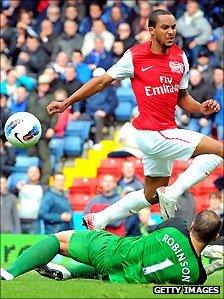
Arsenal are currently near the bottom of the Premier League table
Arsenal may have suffered their worst playing start to a football season for 58 years, but off the field the club's executives are confident they have the winning business tactics.
Chief executive Ivan Gazidis is positive about the north London club's ability to enhance its standing in international commercial markets while also flourishing under new European football finance regimes.
With Uefa's Financial Fair Play (FFP) rules coming into effect, which broadly means clubs cannot spend more than they make, Mr Gazidis believes Arsenal's prudent financial husbandry has left them well placed.
A year ago the club announced record pre-tax profits of £56m, although that figure may not be matched this year.
However, importantly, earlier this year Arsenal's interim financial results showed footballing operating profits of £9.3m.
This figures would mean Arsenal should have no problems in meeting Uefa's FFP break-even rules.
"We are standing on our own two feet," says Mr Gazidis.
"Everything that we have achieved.... has been created by the club itself. It has been done through discipline over time.
"We can plan for a future that sees Arsenal at the top of the game in five, 10, 20 years from now.
"The message of responsibility and continuity is very important for the broader game."
Economic 'adjustment'
He said the club was a role model for others when it came to "financial self-sustainability", and was part of a "solution" not part of the "problem" when it came to addressing football clubs' high spending levels.
"Clubs are going down paths that are not sustainable," he told a meeting of the Sport Industry Group in London.
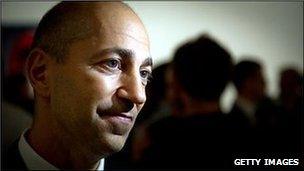
Mr Gazidis is a former deputy commissioner of the MLS soccer league in the US
And he warned that football could not be immune to the wider economic issues facing society at the moment.
"I do hope there will be an adjustment in football to recognise economic realities and concerns," he says.
Mr Gazidis' tenure has unfortunately coincided with a trophy drought at Arsenal stretching back to 2005.
This season has started badly, with an 8-2 hammering at Manchester United being the lowest point.
And there has also been disgruntlement among some Arsenal fans over manager Arsene Wenger's reluctance to splash out on large transfer fees.
But Mr Gazidis denied that the club had to sell players first before they could buy, and said that Arsenal was in "a good cash position".
Youth policy
During the recent player transfer window, Arsenal sold Cesc Fabregas to Barcelona and brought in Andre Santos, Per Mertesacker, Mikel Arteta and Yossi Benayoun to join the current young crop of players at the club.
"Our strategy continues to be to focus on young players," says Mr Gazidis, stressing that there was unity between the manager and board on this issue.
"We know we can't go out and compete with the spending that's out there and frankly, if we did, it would just push the spending to another level so it wouldn't be a successful strategy."
And he said club owner Stan Kroenke, who bought a controlling stake in the club in April, supported the manager in his team-building methods.
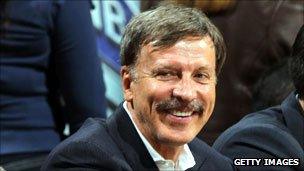
Arsenal owner Stan Kroenke will meet club supporters on his next UK visit
"He is very supportive of the self-sustaining model and of Arsene Wenger," Mr Gazidis says.
"I think Arsene and I and the people at the club are very well supported by a good experienced owner."
And he said that despite a taciturnity with the media, Mr Kroenke was not the "Silent Stan" that he had been dubbed, and had "been very involved throughout and for a number of years with the club".
He added: "Stan has said that he will talk to the fans the next time he is in the UK and he will."
Selling the brand
Mr Gazidis hopes to move away from a focus on the "football business", which he says is relatively small, and concentrate instead on the "football brand".
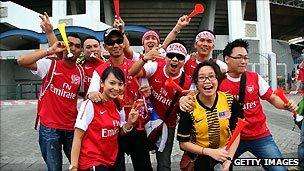
Arsenal had a highly publicised tour of Malaysia and China this summer
The South African-born executive believes football brands such as Arsenal, Manchester United, Liverpool, Real Madrid and Barcelona have the same potential reach as the biggest global multinational brands.
"Football clubs have not yet realised that full [brand] potential," he observes, while acknowledging that football had been good at "selling real estate" in terms of shirt sponsorship and advertising boards.
As part of this campaign at the Emirates to sell the Arsenal brand, the club toured East Asia this summer, playing in Malaysia and China.
It was the club's first pre-season tour outside Europe in more than a decade.
And they would have looked to play in India, if there had not been some logistical difficulties. However, Mr Gazidis says the club will play there at some stage.
Commercial partners
Meanwhile Arsenal's pair of Tier One sponsor deals, with Nike and Emirates, are up for renewal in 2014.
The size of those deals has now been overtaken by those enjoyed by rivals such as Chelsea, Liverpool and Manchester United.
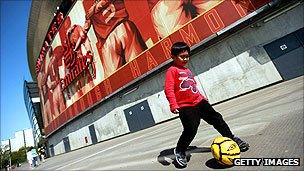
Money from sponsorship deals with Emirates and Nike helped pay for the Emirates stadium
But Mr Gazidis said the club's two main partnerships had played a big part in boosting club revenues.
It was the money from those sponsorships with Nike and Emirates which helped fund the club's move to the new Emirates stadium in 2006, which in turn has vastly boosted its match day revenues.
"We have tremendous partnerships; they have been tremendously supportive of the club," he says.
"We will speak to our partners about renewal terms - we think there is [financial] growth there."
He said the club was also promoting its global commercial name through its "second tier" sponsorships, which had seen it recently sign deals with Indesit, Betsson and Carlsberg, and renew its tie-up with Citroen.
Meanwhile, although the club has made it through the Champions League qualifiers into the group stages, they might not necessarily qualify this season as they currently stand fourth bottom of the Premier League.
But Mr Gazidis insists it would not be a "knockout blow" if they failed to qualify for Europe's top club tournament, and the potential riches it provides.
"Our model is robust enough to take some blows," he says.